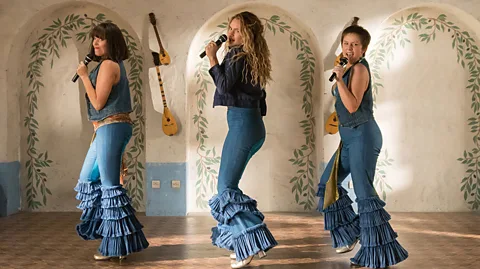Film review: Mamma Mia! Here We Go Again

The follow-up to box-office smash Mamma Mia! The Movie has arrived, but can it match the first film’s success?
Mamma Mia! The Movie was one of the biggest hits of 2008. It made a whopping £466 million ($610 million) at the box office and went on to become Britain’s fastest selling DVD ever. None of that changes the fact, however, that the film was awful: a nerve-mangling collision of negligible plotting, painful singing and Abba tracks that were shoehorned in whether or not whether they had anything to do with the story. Lest we forget, a song about a dancing queen being young and sweet and only 17 was crooned into a vacuum cleaner by Julie Walters doing an Elvis Presley impersonation.
Still, all of these canyon-sized flaws were papered over by the postcard imagery of sunny Greek skies and sparkling seas, and by actors who flung themselves into the proceedings with the kind of superhuman abandon most of us can’t muster without drinking dangerous quantities of Ouzo. Ten years on, the follow-up doesn’t quite have the same boisterous anything-goes atmosphere, so it may not be such a massive success. But, unlike Mamma Mia! The Movie, it is a halfway competent film, and that has to count for something.
More like this:
Written and directed by Ol Parker, Mamma Mia! Here We Go Again is both a prequel and a sequel to its predecessor. Being generous, you could call it The Godfather Part II of juke-box musicals, in structure if not in quality. Being less generous, you could call it fan fiction. The premise is that Meryl Streep’s character, Donna, has died, so it’s up to her daughter Sophie (Amanda Seyfried) to run her Greek island hotel. While Sophie frets in the present day, the film flashes back 30 years to when Donna had a summer fling with three eligible bachelors. In the original film, those bachelors were played by Pierce Brosnan, Colin Firth and Stellan Skarsgård. In the new film we get to see them when they were young and sweet and not too much older than 17.
The flashbacks start with Donna, now played by Lily James, graduating from Oxford University along with her two best friends, Tanya and Rosie. (Alexa Davies and the scene-stealing Jessica Keenan Wynn stand in for Walters and Christine Baranski respectively). To celebrate this occasion they launch into the distinctly dodgy When I Kissed The Teacher: Abba’s best-known singles were used up in the 2008 film, so Parker has to make do with some B-sides and album tracks.
Having got her first big production number out of the way, Donna goes travelling around Europe. In Paris she meets the younger incarnation of Firth’s character, Harry (Hugh Skinner), and duets with him on Waterloo in a Napoleon-themed restaurant. (If Skinner’s gawky characterisation contradicts the original film’s suggestion that Harry ‘Headbanger’ Bright was a kohl-eyed heavy rocker before he grew into a buttoned-up businessman, well, never mind.) After that, it’s off to Greece, where she charms a hunky Swedish sailor called Bill (Josh Dylan plays Skarsgård’s character). And once she is on the island where she will one day build her hotel, she bumps into Brosnan’s character, the sensitive Sam, played by Jeremy Irvine. Confusingly, Irvine played the younger version of Colin Firth’s character in 2013’s The Railway Man, which also featured Stellan Skarsgård, so it’s impressive that he can which of the older men he’s supposed to be.
The film could have been subtitled When Donna Met Harry (and Sam and Bill). Its main difference from Mamma Mia! The Movie is that instead of presenting us with frolicking 50-somethings with wine glasses surgically attached to their hands, it offers a succession of shirtless 20-something men, along with James in a bikini top, so what you lose in boozy bad behaviour you gain in youthful freedom, optimism and toned abs. There aren’t many lightweight, feel-good romantic comedies around these days, so Parker deserves credit for whipping up such a fluffy cloud of cinematic candy floss.
The screenplay, which Richard Curtis helped him develop, has just enough waspish one-liners to get by, and the gags are balanced by some wistful consideration of loneliness and loss, even if the dialogue never matches the heartbreaking pathos of the songs themselves. More importantly, Here We Go Again is illuminated by James’s star quality. The scenery isn’t as sunny or as sparkling as it was in the previous film – it was shot in Croatia rather than Greece this time – but James radiates enough smiley positivity to make up for it. And, in contrast with certain of the cast, she can actually sing.
The sequences set in the present day don’t shine so brightly. Sophie keeps frowning, the other main characters are scattered around different countries, and, of course, Donna is absent, so nobody gets into the holiday spirit. It’s only at the end that Parker summons up the galumphing camp and rollicking randomness of the 2008 film – and he has to helicopter in Cher to do it. Anyone who adored Mamma Mia! The Movie will be delighted by the way she turns Here We Go Again into a glitter-strewn karaoke party. But it’s the cheerful fun of the flashbacks which make it bearable to the rest of us.
★★★☆☆
If you would like to comment on this story or anything else you have seen on BBC Culture, head over to our Facebook page or message us on Twitter.
And if you liked this story, sign up for the weekly bbc.com features newsletter, called “If You Only Read 6 Things This Week”. A handpicked selection of stories from BBC Future, Culture, Capital and Travel, delivered to your inbox every Friday.
